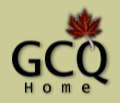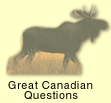| |
Article
One by Barry Cooper
Biography &
Books
 ust
because Canada exists doesn't mean it ever was founded. In fact,
the whole notion of founding a country is alien to Canadian experience.
Founding is something undertaken by a Machiavellian
"new Prince," but Canadian sovereignty has devolved historically
from the very old British crown. The Americans and the French, with
their fancy republican ways, speak easily enough about their founding
fathers - Washington, Madison, Robespierre, Marat and all the rest.
Canadians don't. ust
because Canada exists doesn't mean it ever was founded. In fact,
the whole notion of founding a country is alien to Canadian experience.
Founding is something undertaken by a Machiavellian
"new Prince," but Canadian sovereignty has devolved historically
from the very old British crown. The Americans and the French, with
their fancy republican ways, speak easily enough about their founding
fathers - Washington, Madison, Robespierre, Marat and all the rest.
Canadians don't.
True, we use the same patriarchal language and speak of the fathers
of Confederation, but nobody talks about the fathers of Canada,
which indicates clearly enough that Confederation was an episode
in Canada's evolution, not a brand new beginning. A few intellectuals
might indulge in loose talk about the Canadian founding, but they
ought to know better.
Usually the act of founding is accompanied by a heavy traffic in
high-minded ideas intended to make the new citizens feel good about
the violent things they are doing. Truths are held to be self-evident.
The founders promise liberty,
equality and sisterhood, or peace, bread and other people's land.
None of that has ever happened in Canada, though political parties,
such as the New Democrats or Reform, have staged founding events
to haul themselves into existence.
Unfounded though Canada is, our early political life was not hostile
to ideas. They were not expressions of grand new principles but,
as contemporary politicians would have said, embodied "well known"
ideas. They were well known because they were part of a tradition
the origins of which were discreetly shrouded in the mists of time.
Chief among them were the principles of parliamentary government
and of liberalism.
They remain important today. Indeed, many of our difficulties, as
well as our successes, are a direct reflection of the extent to
which we have maintained liberal and parliamentary government, or
drifted away from it.
At the closing of the first session of the first parliament of Upper
Canada in 1792, Governor John Graves Simcoe reminded his advisors,
"that this province is singularly blest, not with a mutilated constitution,
but with a constitution which has stood the test of experience,
and which is the very image and transcript of that of Great Britain."
The sentiments were recalled in the British North American Act of
1867, when Canada received "a Constitution similar in Principle
to that of the United Kingdom," and, in a more muted way, in the
1982 constitution as well.
In fact, parliamentary government in North America began long before
the American Revolution. In its primitive form, elected assemblies
could not control the executive. After the publication of Lord Durham's
famous Report, the course toward responsible government and today's
parliamentary institutions was set, at least in eastern Canada:
the Crown is advised by a council that is supported in an assembly
that in turn raises and spends money. Parliamentary government is
finely balanced between executive decisiveness and the need for
prudent and public justification of policy before the sceptical
eyes of a "loyal opposition", which is also a government-in-waiting.
Responsible government, parliamentary government properly speaking,
came to the old colonies of British North America around the middle
of the nineteenth century. On the prairies, however, it was delayed
"for the purposes of the Dominion" until 1930, when the provinces
gained control over resource revenues. The timing could not have
been worse. A decade of severe deflation, followed by the massive
centralization of wartime, meant that political leaders in the West
were deprived of practical education in the ways of parliament that
their colleagues in the east had experienced for a least a generation
before 1870.
In consequence, while liberalism in the West has been robust, it
is also often extra-parliamentary. From the nineteenth-century agrarians
to today's Reform Party, populist
liberalism has mounted a serious challenge to the conventions of
parliament. When sovereignty is thought to be vested in "the people"
and not in the crown, the implications for cabinet, the executive
and for the assembly are huge. Populist measures - the initiative,
referendum and recall, for example - are in fact incompatible with
parliamentary government. You can have one or the other, not both.
As a result, the populist liberalism of Canada's west has been a
recipe for distress. Sometimes it has been dismissed as a reflection
of the unwillingness of Parliament in Ottawa to respond to the interests
of Westerners. From the National Policy of Sir
John A. Macdonald to the National Energy Programme of Pierre Trudeau,
evidence to support this view is not hard to find. But more than
interests are involved. Injured pride, not neglected interests,
lies behind the ambivalence of many Westerners towards parliamentary
government and "Ottawa."
Pride matters. Indeed, human beings are especially proud when they
rise above their interests, which is why the pride of Westerners
is especially insulted when the beneficiaries - easterners for the
most part - are so palpably ungrateful.
In so many ways Quebec is a mirror image of the west. There "Ottawa"
carries the same ambivalent symbolic charge, but for quite different
reasons. In Quebec, the levers of parliamentary power have been
energetically grasped, but diverted to distinctly non-liberal purposes.
It is useful to recall that in Quebec liberalism came ashore with
the soldiers of General
Wolfe in 1759. In those days, its most important element was
freedom of religion, which opened the way for non-Roman Catholic
and often English-speaking traders to settle in the newly acquired
colony and to prosper. Once again the effect of this infusion of
liberal enterprise led to the recommendations of Lord Durham. But
many French-Canadians were less interested in individual liberty
than in sheltering their community from the malign outside forces
that the entrepreneurial English liberals seemed to represent. This
is why Durham's name is still mud in Quebec.
The same religious solidarity of the eighteenth-century resistance
to liberalism could be detected in the writings of Abbé Lionel
Groulx fifty years ago. With the massive and rapid secularization
brought about by the Quiet Revolution, the words changed, but the
music remained the same. The elegant Hegelian
rhetoric of a sovereigntist such as the late Fernand Dumont, for
whom every distinct society achieves fulfillment and proper form
as a state, or the claims in favour of "deep diversity" made on
behalf of Quebec by a federalist such as Charles Taylor, resonate
with the same anti-liberal communitarian
survivalism pioneered by François-Xavier Garneau a century
and a half ago. Garneau's long poem, Louise, as his multi-volume
Historie du Canada, were as much a littérature de combat
as anything from the pens of contemporary Quebec nationalists, whether
sovereigntist or not. Plus ça change. . . .
In fact, many things have changed since the days of Simcoe, Durham
and Macdonald, but the principles they espoused can still be detected
without too much effort. And yet, pure parliamentary liberalism
has never worked in Canada. All Canadians, and especially those
in the unmovable centre of the country, Ontario, should be grateful
for the impurities supplied by the communitarian realities of Quebec
and the extra-parliamentary populism of the west. They provide the
colour and flavour to Canadian politics, the leaven that makes federalism
work, even though it violates not a few of the explicit intentions
of the fathers of Confederation.
|






